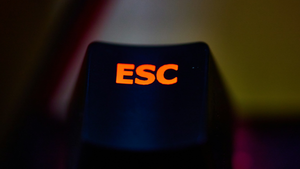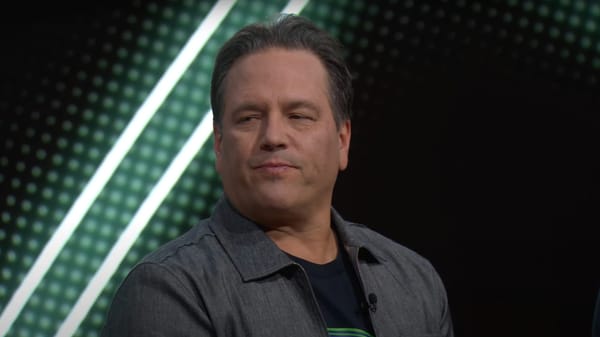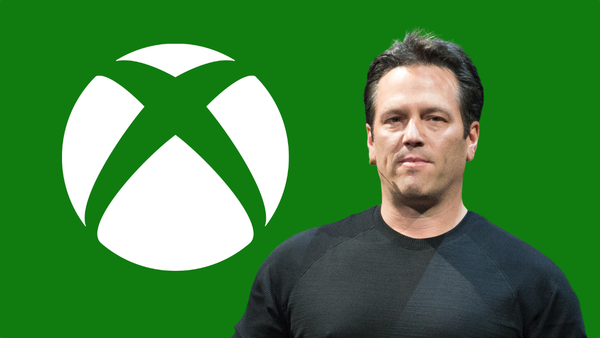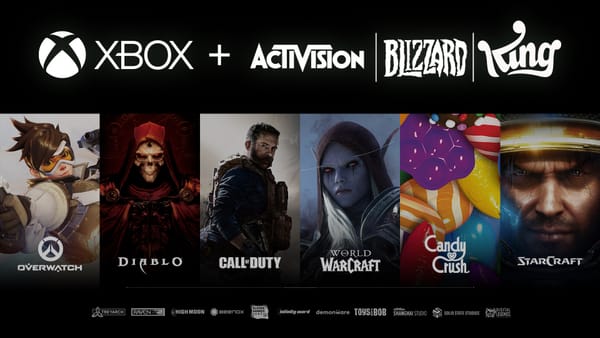
2023 was a great year if you play games, but not as great if you worked in the industry.
Plenty of successful titles were released, like Star Wars Jedi: Survivor, Marvel’s Spider-Man 2, Baldur’s Gate 3, and The Legend of Zelda: Tears of the Kingdom. But at the same time, the stories of layoffs seemed never to end, with around 6,500 people losing their jobs. In an industry that was doing so well, it was hard to understand how so many workers could be cast off when they’re so central to making the products that generate corporate success in the first place.
There’s already a lot of excitement about what’s coming down the pike in the coming years, especially with the official announcement that Grand Theft Auto VI is slated for 2025. But if the games industry continues being so hostile for its creative talent, it doesn’t spell good news for the people who work in it or the players who won’t get the high-quality, thought-provoking games they expect.

I wanted to understand why this was happening and how larger capitalist forces are affecting the industry, so I spoke to Nels Anderson, founder of Sonderlust Studios and previous co-founder of Campo Santo, known for Firewatch. We don’t discuss the massive Microsoft acquisition of Activision Blizzard, but we dig into the layoffs, consolidation, and where things go from here.
Interview edited for length and clarity.
There’s been criticism of the Game Awards for a while for how it acts more like a promotional tool for games companies rather than a celebration of developers who actually make the games, and I feel like that was particularly notable in the show that happened this year. What do you think of the Game Awards, especially in a year where there's been so much tumult in the games industry?
That one’s really challenging because — the Game Awards aside for a moment — that recognition does mean a lot to the people who work incredibly hard on these games. I saw a video clip of some folks at Larian Studios when Baldur’s Gate 3 won I presume Game of the Year and like, they were just losing their minds. To have worked that hard for that long on a game of that scope on a team that is big, but not that big, is like pretty remarkable.
At the same time, this year for the games industry has been an absolute bloodbath with many thousands of jobs lost for reasons that occasionally might be rooted in difficult financial realities, but often are not really about that. And for that not to be acknowledged in any way during the event is pretty hard to see. Obviously, yes, the thing is meant to be celebratory, but also like, there’s a place for that kind of acknowledgement. So, it’s tough.
It definitely stands out, especially when people are being shooed off the stage with just 30 seconds to say something when they win a major award. As you mentioned, this has been a really tough year for the games industry. There have been mass layoffs across many different companies. Why is this happening and what impact do all of these layoffs have when they’re hitting so many companies and so many workers in the industry?
Part of it is due to the global forces of capital, right? A lot of places did expand pretty significantly over the pandemic for reasons that, at the time, largely made sense. The increase in spending when everyone was locked up in their home and not able to do much but watch TV and play a video game could not stand forever, and then you combine that with how much the cost of living is skyrocketing for almost every person on the planet, as well as like interest rates in a way that affects venture capital and a bunch of stuff that I don't fully understand. So it’s that ugly collision of different forces.
Often the dynamics of these layoffs, particularly at very large organizations, really have nothing to do with profitability. It’s all about signaling, where it’s like, economic times are tough, but we’re trying to be lean. But it’s like, you gave your C-suite $300 million in bonuses and I don't think you’re sending $300 million out the door in salaries every year. Maybe there’s a different way to arrange this guys! But that doesn’t happen.
The impact is going to be profound. Obviously there’s the impact on individual people who don’t have a job anymore, and are now looking for one in an incredibly competitive environment. That’s very rough on the individual level. But on top of that, the loss of institutional knowledge in some of these studios is just brutal. There’s a lot of very particular knowledge in video games and when some people wash out of the industry they don’t come back. Making games rules, but it’s also very challenging. It’s one of these professions where it’s badly compensated because lots of people want to do it. I could make way more money, like writing software for a bank or whatever, but I would have long since thrown myself into the sea.
Some of the things that can happen after this is like the acorns that only emerge after a forest fire or whatever: lots of smaller organizations have come up after big periods of industry tumult. It seems like there’s one every seven years or so, but there was another one in the mid-2000s, particularly here in Vancouver, where a ton of huge studios did massive layoffs. It was difficult for many people, but it did also end up seeding people who were experienced and talented and were able to start other studios, some of which have gone on to be tremendously successful. So sometimes there can be a little bit of renewal after the burn. But it comes at a very high price.
One thing that has been very clear looking at the industry in the past number of years is increasing consolidation, where you've had so many companies merge or be bought up. There’s no clearer example of that than Embracer Group, which was on a buying spree with all the cheap money that was sloshing around and now the wheels have come off whatever they were hoping to build. What do you think about that company, and the broader issue of consolidation and what it’s doing to the industry?
Embracer is the ur-example of a very unhealthy trend of consolidation. Their buying spree was on a scale I have not seen in my 15+ years of doing this, and maybe has never happened before. They have 129 internal studios and like 15,000 employees. Nintendo, maker of Mario, Zelda, and Donkey Kong, has like a little over 7000 employees. Embracer is genuinely one of the largest game entities on the planet at this point. But the entire thing was pretty clearly a house of cards.
As you mentioned, there was a lot of cheap capital available so they were buying stuff up in an almost cartoonish example of a corporate roll up, where they get a bunch of private equity or venture money, suck up a bunch of companies, and now that they've got this massive portfolio, find some way to leverage that to some other entity that wants to buy them. There was very clearly never an intention to run a genuinely sustainable, profitable business. It was just like pulling a pin out of a grenade and hoping that they could hand it off to somebody else before it exploded. But then Saudi Arabia said, Actually, no, we’re gonna not give you our money, and there was no backup plan. It is truly bonkers.
With that many studios, sure, they make money. But they have to service this massive amount of debt they have and there’s still a lot of overhead. None of it makes sense at all, so they’re now closing storied studios that have been successful for, in some cases, over two decades. They closed Volition, who made Saints Row and Red Faction. They were in Illinois and were like the anchor studio for the games industry in that part of the United States. And they’re just gone. They also bought Crystal Dynamics, and now there are layoffs there. They bought Square Enix’s North American studio Eidos Montreal, and who knows what’s going to happen there. It’s probably not going to be anything good.
These studios that had successful track records as independent entities themselves. Could they deliver 10x or 100x cartoonish returns that private equity and venture capital expect? Absolutely not! But could they be successful businesses in their own right? Yeah, absolutely. Aside from some people who probably made bank when Embracer bought their studio with leveraged money — although hopefully most of that was cash and not stock — everybody’s losing here. I’m gonna go out on a limb and guess that not too many of those acquisition dollars trickled down to the actual staff.
You gave us one picture of monopolistic practices, but there's another major one that has been particularly consequential in independent game development. Unity, which makes one of the major game engines, did its own cheap-money binge during the pandemic. They bought a division of Weta in 2021, which is a visual effects company, as they tried to expand their business, then laid everyone off recently when they realized that that wasn't going to work out. But they also decided they were going to completely upend the terms they had with developers using their engine. What happened there and how are developers feeling about Unity now?
I mean, not great. This is one of the most unhinged things I've seen in my entire time in video games. Unity announced a couple months ago that they were changing their pricing model. If you’re doing a game in 3D, you’re either rolling your own engine, you’re using Unreal, or you’re using Unity. There are a couple other smaller ones like Lumberyard or Source, but the two big ones that people use are Unity or Unreal. And with Unity, you always got what you paid for.
Until recently, Unity was much more affordable most of the time than Unreal. Unreal’s pricing model, as of the last three or four years, is basically just that if your game makes more than a million bucks, you give them 5%, which if you do the math, eventually can become like many, many, many dollars. But you’re also getting millions of human hours of engineering on very good technology that is regularly used to ship humongous video games. Meanwhile, with Unity, you pay a few hundred dollars a month per person if you’re on their pro license and you need to ship on consoles and all that kind of stuff — and that’s just it. It’s still not nothing, but it was easy to plan for because it was a very fixed amount. You could literally put that in your budget spreadsheet. But then they were like, What if instead, every single time someone installed your video game, you have to send us 20 cents? It was genuinely one of the most incoherent things I have ever seen.
Supposedly — there's been some reporting on this — it had been worked on for a very long time, but it felt like someone wrote it in a bathroom cubicle on the back of a napkin at three o’clock in the morning after the seventh day of a bender. It just made no sense. From the outset, it was clear that, particularly for people who make their games and then just sell them to people, the implications of this pricing change had not been thought out at all. During that first week when everyone, very rightly, collectively lost their minds, executives were giving conflicting information. It’s like, wait a minute, you’re saying “per install,” so if somebody uninstalls the game because they got a bigger hard drive, then they install it on their newer, bigger hard drive, we have to pay again? And some people said yes, and other people were like, well, we have a proprietary algorithm that will determine the proper number.
Then when asked another very obvious question about what happens when your game is in one of these subscription services like Xbox Games Pass or it’s given away for free on the Epic Game Store, and whether each of those installs count — because in this space of a few days millions of people could install your game, but you’re not getting meaningful per person revenue from them — they were like, Oh, don’t worry, Microsoft will just pay the fee. To which Microsoft was like, Wait, we will? It was fully unbelievable, so obviously, everyone just exploded about this.
Unity’s business is not video game engine technology. They’re into mobile ad monetization and analytics; that is their business at this point. The amount of revenue that comes from the actual game engine side of things is very small, and almost all their money and potential growth is from this ad network stuff. A little over a year ago, Unity merged with this company called IronSource for $4.4 billion as this counter move against this other ad platform called AppLovin, and the whole fee change thing was very clearly about: 1) how do we get humongous mobile games like Genshin Impact and Pokémon Go — most of which are built using Unity; more than half of all mobile games are built using Unity — to give us more money? And 2) how do we force more people to use our ad network instead of AppLovin or one of the other ones?
A lot of the animus from smaller independent studios could have been completely avoided if they only applied the new terms when your game is free, while if you sell your game on Steam for $25 or $30, you would just keep paying them the normal fee. Eventually they walked back the fee to something that’s still very weird, but is slightly more palatable where it’s like a maximum of 2.5% of your earnings, but there’s still some other weird per-activation fee. It went from a thing that was incoherent and untenable and probably not even legal to something that’s just quite bad.
All of this is driven by weird Silicon Valley, venture capital, private equity, investment garbage that has nothing to do with the technology of making a video game engine. If you look at Unity’s share price, it’s just like the altitude chart of a series of hills just like slowly descending toward the ocean because you can’t make a business out of making a video game engine that will give you the returns that Sequoia or Silverlake want. But can you make a business that pays for the development of a video game engine, but doesn’t deliver like cartoonish returns? Yeah, but that’s not the company Unity is anymore, and they haven’t been for probably a decade at this point.
It’s a huge bummer because there’s been this huge explosion of independently created video games. There were a handful of factors that did that, but the most significant — I think — are the proliferation of district digital distribution — obviously Steam, but also what started out as Xbox Live Arcade and PlayStation Network and Nintendo's various online stores — and secondary to that was the availability of Unity as a much simpler, off-the-shelf game engine that enabled a lot of creation from people who don’t have computer science degrees the way that I do or whatever.
Rolling your own game engine is hard, but even if you were using like Source or whatever in 2004, it was still an incredibly technical tool and Unity was able to be more accessible. It was often taught in university courses and one of the best things about it was there was just so much resourcing around it. It became so much easier for people to have a thing that they could just download and start making something from. And some wildly incredible games came out of it that probably never would have existed had Unity not been around. So having to hold that with what Unity is now is a lot of feelings and none of them are positive.
We’ve talked about the issues with Unity, consolidation, layoffs, and the broader capitalist forces pushing on the games industry, but what does it all mean for independent game development?
I don’t know, and I don’t know if anyone knows. The thing I can definitely say is that it’s been a very challenging time, particularly for smaller organizations. Sony PlayStation is not going anywhere. Electronic Arts is not going anywhere. But I know smaller studios who, not to do performative optics for shareholders, but just due to literal inability to find funding in a way that would have been incredibly reliable 6-12 months ago or because of games not hitting the projections they were hoping, have had to lay people off or close completely. Every one of those is heartbreaking. So exactly where this all winds up going, I don’t know. But what I know is that things are very challenging right now.
For people like myself, but also many peers, we just we just sell our games to people for dollars, right? There's no weird ad scheme; it's just the most basic transaction where we’re going to ask for some support because we still have to pay for our rent and buy groceries, but we’re also going to ask for some of your time, which is the most valuable thing that anybody has. Almost all small developers, all they want to do is provide someone something that, in that time, will provide some enrichment. That could just be raw amusement and joy, which is awesome, or some more profound observation about about the world.
If those experiences matter to you, this is the time to support those people in whatever way you can. Instead of buying someone a gift card for Christmas, maybe send them a game they had wishlisted on Steam, or throw some things you’ve been looking at into your own cart to use the gift cards you got for the holidays, or even just send a note to someone who worked on a game that really meant something to you. More than anything else, those have been some of the experiences that have been the most transformative for me. Those moments of connection, hearing from someone who really did feel like that time they gave to something that we made really meant something to them, there’s nothing that compares to that.
Ultimately, people have been finding ways to create games for each other for as long as there have been people. There will always be some form of this, but things have been really rough over the last year and I think the storm is not over. So anything that anybody who cares about these things can do right now is profoundly appreciated.









Member discussion